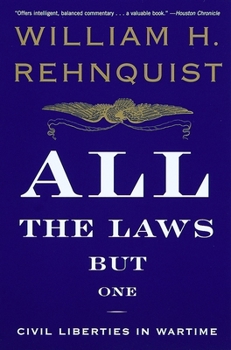All the Laws but One: Civil Liberties in Wartime
Select Format
Select Condition 
Book Overview
In 1861, with the survival of the United States in jeopardy, Abraham Lincoln--the Great Emancipator and champion of human freedom--responded to the national threat by suspending the writ of habeas... This description may be from another edition of this product.
Format:Paperback
Language:English
ISBN:0679767320
ISBN13:9780679767329
Release Date:January 2000
Publisher:Knopf Doubleday Publishing Group
Length:288 Pages
Weight:0.63 lbs.
Dimensions:0.6" x 5.2" x 8.0"
Customer Reviews
4 ratings
Writ of Habeas Corpus / Civil Rights in War Time
Published by Thriftbooks.com User , 15 years ago
This is a brief book written by the late U.S. Supreme Court Chief Justice Rehnquist. If you want a brief overview of U.S. civil rights and their suspension during war, this book is for you. It is a short, but interesting history, and it cites all the main cases up to its time (i.e., before the latest Iraq War and the War on Terror). The book discusses Abraham Lincoln and the Civil War and the suspension of the ability to obtain a Writ of Habeas Corpus (the famous suspension of the Writ of Habeas Corpus). A Writ of Habeas Corpus (which generally translated means a "writing to bring me the body"). It is generally the ability to go into U.S. federal court and have the judge issue the writ to government (including, the military) to bring a prisoner before the court in order for the court to be able to determine if his or her detention is legal. This provides the person detained with the ability to have his detention reviewed by a court to determine if the detention is legal or not. Thus, this is one of the most important rights a U.S. citizen has; it is a right that allows him or her to go before a judge in order to protect all his or her civil and other rights. It provides legal review against illegal or arbitrary detention, etc. Among other topics, the book also discusses FDR's and the U.S. government's internment of U.S. citizens of Japanese origin or descent, generally those residing in California and other western U.S. states, into internment camps, during World War II. Thus, this book is a good, interesting, history of the topic of U.S. civil rights during war and national emergency and thus is relevant to today. It is good book for attorneys, civil rights activists, as well as people interested in their rights as citizens of the U.S. In time of war and emergency, civil rights are often violated, we as citizens need to be on guard. The ancient Roman Senate, in times of certain critical emergencies, including some wars, used to appoint a "dictator" - usually for a six-month term, which term was sometimes renewed. It gave the dictator power, and he was free from following certain laws (most laws) in order to remedy the emergency. This is where we get the term "dictator". The U.S., thankfully, does not have this system, and we cannot allow anyone to say that an emergency suspends the rights of its citizens or gives our leadership power free from the operation of law. The U.S.'s founding fathers studied Roman history (as well as Greek), and learned from it. There is no provision for a dictator to be appointed. We have a tri-partite system that checks itself. However, it requires the vigilance of the courts, but most importantly, the vigilance of its citizens. You can read Rehnquist's book to see if you agree with Abraham Lincoln, FDR, and the courts, and whether you believe they were right or wrong, or whether there should have been more pressure from ordinary U.S. citizens.
Brilliant and prescient
Published by Thriftbooks.com User , 18 years ago
Rehnquist wrote this before Sept 11, but it is a book that has added meaning today. Mostly the Chief Justice focuses on the suspecnsion of Habeas Corpus by ABraham Lincoln and its ramifications for Civil Liberties and the abuse of them during war time. This is not a lively account, but it is accurate, well thought out and makes for interesting reading, having added strength of authority by nature of its author. Seth J. Frantzman
A great look into the mind of a justice
Published by Thriftbooks.com User , 21 years ago
Chief Justice Rehnquist has now written 3 books, all of which I have read. I actually don't find them too controversial, although some of the internet reviewers seem to. I do find all of Rehnquist's books, especially this one, to be great reviews of the relevants cases and controversies about a given topic. He is especially thorough in this book, tracing the suppression of civil liberties in the Civil War, World War I and World War II. He covers numerous cases during the Civil War (McCardle, Milligan), as well as an extensive look at Johns Wilkes Booth's murder of President Lincoln and its aftermath.Supreme Court justices do not often publicly announce their philosophies outside of their opinions. Although Rehnquist seems to be objective for the most part, this book is still a fascinating look into the mind of one of most influential justices of the past quarter century.
An Enriching Experience
Published by Thriftbooks.com User , 22 years ago
The brilliant Chief Justice has done it once again defintively expressing history through a judicial lens. In this marvolous feat the Chief Justice goes into further detail about Taney Rebuking Lincoln, the Steelworkers case of the 50's, and the American incarceration of Japanese citizens. In this account the Chief Justice gives numerous citations of Supreme Courts changing of paradigms during War time. The Chief has shown once again to have a brilliant graspe on history, just like he does in his practice of "judicial defference" on the high court. A must book for any serious student of history and of law. However, to enjoy this book prior knowledge of the Supreme Court and history should be required.




